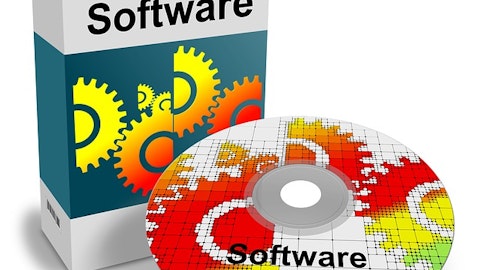We know that as teams adopt a more agile methodology with more experimentation, they’re trying out more content, more strategies, they are bringing more moments in the user journey into this agile and experimental framework instead of just having it be some sort of transactional message or something that is hard-coded which is so often the case with a lot of product delivery, you would — as a brand you would definitely benefit from turning those into growth experiments. But you leave them where they are, because it just takes a lot of human power to be able to turn those into these experiments. And so we’re really excited to see the impact of making the individual marketer more productive. I think that it will — in my mind, I think right now the number of customer engagement practitioners and the economy is still very low compared to the potential that more and more brands have.
I think that we’re going to continue to see software like Braze make them even more productive, which improves the ROI function for bringing those teams together and for up-leveling them. And I think that there are also some just really exciting things happening from a skill set perspective, I spoke about some of the second order effects of there being more pressure toward getting higher speed data, to be able to have a more comprehensive view of it. I think also when we look at the second order effects of wide scale adoption of tools like ChatGPT, they’re going to catalyze other changes in the labor force, and you’re going to see more people becoming comfortable with basic scripting and other low code approaches automation. And you see that in some of the features that we have that we’re working on right now where SQL or HTML templates or looking at data transformer, logic or the liquid logic that enables personalization, these are all slightly technical concepts that definitely are not accessible by all marketers.
And what ChatGPT and other sorts of co-generating co-pilots are going to do is, it’s going to — first it’s going to help generate them. But second, it’s going to really teach people that they can be more comfortable working with these more advanced ideas. It also, I think, increases ROI in other systems to be able to use first party data and real-time data. Both of which should encourage ancillary investments that kind of pave the way for Braze to enter the environment, while also creating more catalysts to move off of legacy deployments, whether it’s legacy data warehouses, maybe people moving from on-prem into the cloud to take advantage of more elastic compute capability or moving off of legacy Marketing Clouds and Point Solutions. So I think this all comes together and really at the end of the day by improving the ROI of the investment by enhancing productivity, we see — we should see both the software spend and just the size and the skill set of the community around customer engagement continue to grow.
Gabriela Borges: Yes, that makes sense and it ties nicely into a little bit of the longer-term roadmap question. You mentioned the dynamic around consolidation of point products. You talked a little bit about competition. How are you thinking about Braze expanding longer term outside of marketing into perhaps adjacencies and other front office applications?


